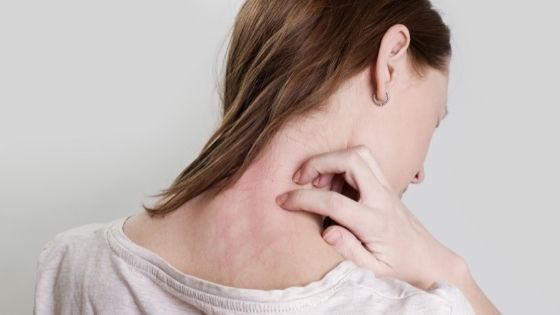Psoriasis is a non-communicative inflammatory disease of the skin. It is characterized by thick patches of skin that flake off. The plaques get lodged in different places on the body, most often on the elbows and knees. They leave areas of red skin.

Psoriasis can be very uncomfortable when it occurs on the palms of the hands or the soles of the feet, or even painful when it is in the folds of the joints. It depends on where the plaques are located and the extent of the disease, psoriasis can cause discomfort and interfere with social life. So time Psoriasis treatment, is a must.
Causes
Psoriasis causes excessive proliferation of skin cells, keratinocytes caused by an alteration in the interaction between the cells of the epidermis and those of the dermis.
- Psoriasis is caused by too rapid turnover of cells in the epidermis.
- A normal skin cell takes 28 to 30 days to mature and disappear during peeling. However, this cell matures much more quickly in psoriasis, between 3 and 4 days.
- The causes of psoriasis are not determined, and many hypotheses are raised.
- However, it seems that genetic participation frequently occurs, psoriasis frequently occurs in predisposed terrain.
General symptoms of psoriasis
Here are the symptoms common to the different types of psoriasis:
- The layers of the skin regenerate faster than usual,
- Lesions cause itching and irritation
Psoriasis mainly affects people between the ages of 15 and 35, and although the average age of people diagnosed with it is 28, it affects people of all ages.
In its most common form, plaque psoriasis appears on specific areas of the skin, forming patches of varying sizes, red and covered with dry, silvery scales. Skin lesions may itch and cause pain. The inflammation is intermittent, and there is no cure for this condition.
- Plaque (or vulgar) psoriasis. Well-defined red patches, round or oval, covered with thick crusts of white skin which peel off.
- Psoriasis of the nails. Abnormal growth of the fingernails and toenails and discolouration of the nails. The nails can separate from the skin and sometimes fall apart.
- Scalp psoriasis. There is a presence of dandruff.
- Guttate psoriasis. Teardrop-shaped plaques are often found on the trunk, arms, and legs.
- Invert psoriasis. Plates that appear inside the joints (in the armpits, groin, near the genitals) are moister than dry and sometimes painful when exposed to friction.
- Erythrodermic psoriasis. Almost all of the skin is red and inflamed.
- Pustular psoriasis. Plates are covered with white pustules, especially on the hands and soles of the feet.
Risk factors
Certain factors can sometimes trigger psoriasis flare-ups:
- Infection: An infection such as pharyngitis or sore throat may precede the onset of psoriasis.
- Certain drugs, whether given orally or locally, may be risk factors for the onset of psoriasis: These drugs include lithium, corticosteroids, beta-blockers, ACE inhibitors.
- Prolonged exposure to the sun
- Trauma and injury to the skin, such as scratches or surgery, may precede the onset of psoriasis at the site of the lesion.
- Excessive alcohol consumption.
- Chickenpox
Prevention
Preventive measures to decrease the frequency and intensity of rashes
There is no known way to prevent psoriasis. However, it is possible to reduce the frequency and intensity of the eruptions. It is about observing what triggers the onset of symptoms. This process requires time and patience.
Complications
Complications of psoriasis can be the risk of suffering from psoriatic arthritis or joint psoriasis (up to 20% of people with psoriasis). Psoriatic arthritis is a condition that causes joint pain and can lead to joint deformities. However, to reassure people with psoriasis, increasingly effective treatments can treat and prevent this risk of complications. Talk to your doctor.
Another more general complication is the risk of suffering from psychological complications. (anxiety, depression). Indeed psoriasis can be challenging to bear compared to society. It can be a source of shame and withdrawal into oneself and, therefore, loss of confidence on the part of the patient. Consequently, it is essential to talk about it with your doctor, especially those around you.
Processing
There are many treatments whose indication is weighed by the specialist of Psoriasis treatment New York depending on the type and severity of the disease. Among these, we can cite
- Creams, most often based on corticosteroids, keratolytic (salicylic acid, urea, etc.) or vitamin D derivatives.
- Ultra Violets (UV), delivered in medical cabins at the doctor’s office
- Oral treatments (vitamin A derivatives, methotrexate, ciclosporin, etc.)
- Finally, biotherapies, administered by injections
